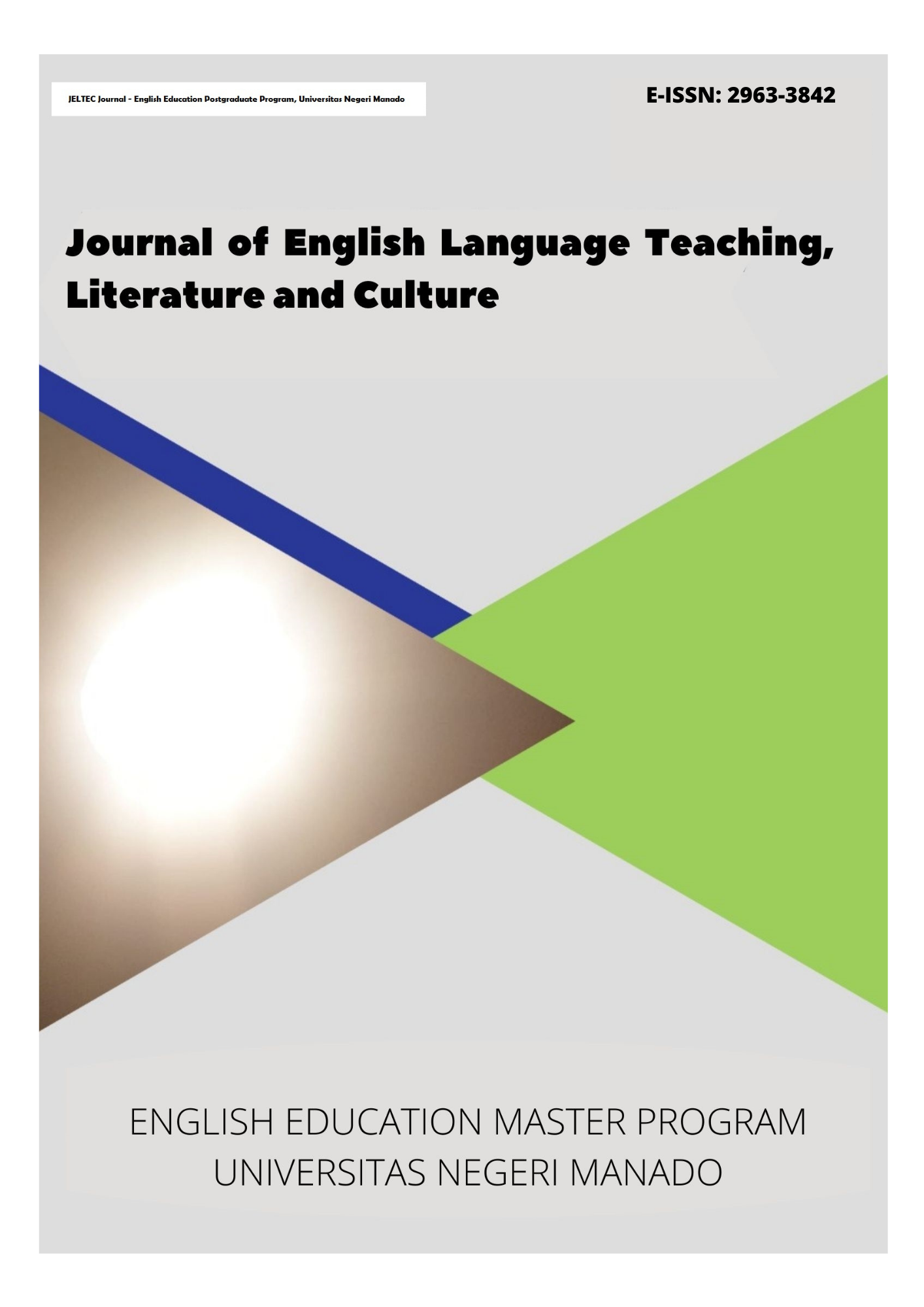An Analysis ofStudents Video Assignments: A Case of EFL Students ata Public University
DOI:
https://doi.org/10.53682/jeltec.v3i2.9925Keywords:
Analysis; Video assignment; EFL Students; EnglishAbstract
Video assignments become an increasingly popular tool in education nowadays It offers students a dynamic and engaging way to demonstrate their understanding and performance This research focuses on the students analysis of EFL students video assignments The aims of this research are to find out how much the students understand assignment and how well they manage the contents of their videos Qualitative research and video analysis framework were used in this study to collect and analyse the data of the EFL students who study in their third year at the research site The eight videos were adopted from the EFL students to analyse and collect the data The study found three elements of videos structure such as introduction body and conclusion of the videos EFL students greeted audiences introduced topic structure expectation and engaged interests in the introduction part of the video During the videos students mostly used body languages facial expression voice of tone pronunciation and topic comprehension However students missed using some contents in the conclusion of the videos comprising quotation recommendation and asking for giving comments from audiences for the improvement of their videos Additionally this study may serve as a reference or motivation for further research in the same area This research suggests future researchers to focus on vid1eo analysis in different context participants and analytical framework to minimize the research gaps Classroom teachers should use these results to improve the quality of video assignments in their class < em>< p>
References
Bax S 2011 Normalisation revisited: The effective use of technology in language education International Journal of Computer Assisted Language Learning and Teaching IJCALLT 1 2 1 15 10 4018 ijcallt 2011040101
Chen Y Y Chang Y S Lee J Y Lin M H 2021 Effects of a video featuring connected speech instruction on EFL undergraduates in Taiwan SAGE Open 11 2 https: doi org 10 1177 21582440211019746
Chen D Xiang P Jia F Zhang J 2020 An Indicator System for Evaluating Operation and Maintenance Management of Mega Infrastructure Projects in China International Jornal of Environmental Research and Public Health DOI: 10 3390 ijerph17249589
Dharmawardene R P Wijewardene L 2021 Effectiveness of teaching in blended mode: A case study from Sri Lankan University System Open Access Library Journal 8 9 1 14 10 4236 oalib DOI: 10 4236 oalib 1107883
Douglas Magin Phil Helmore 2001 Peer and Teacher Assessments of Oral Presentation Skills: How reliable are they? Studies in Higher Education 26:3 287 298 DOI: 10 1080 03075070120076264
Grussendorf M 2007 English for presentation Oxford University Press
Hyun suk S Sub M J Jin il K 2000 Teaching English by using video Retrieved on September 25 2012 from http: english daejin ac kr rtyson fall2000 elt video html
Ichsan M H Apriliaswati R Rosnija E 2017 Improving students speaking skill through project based learning Khatulistiwa 6 2 1 11 http: dx doi org 10 26418 jppk v6i2 18718
Leong L M Ahmadi S M 2017 An Analysis of Factors Influencing Learners English Speaking Skill International Journal of Research in English Education 2 1 34 41 https: doi org 10 18869 acadpub ijree 2 1 34
McDonnell I 2001 The role of the tour guide in transferring cultural understanding
Nuopponen A 1994 Begreppssystem f r terminologisk analys Acta Wasaensia University of Vaasa
Pratiwi S W Triprihatmini V 2018 Students Perception on the Use of Video To Assess Performances in Public Speaking Class LLT Journal: A Journal on Language and Language Teaching 21 Suppl 33 42 DOI: doi org 10 24071 llt 2018 Suppl2104
Puspitaningtyas Maria V W 2018 Student Perception On The Use Of Subtitled Video To Increase Their Motivation In Learning English: A Case In Smp Pangudi Luhur Moyudan pp 1
Qiong O U 2017 A Brief Introduction to Perception Studies in Literature and Language 15 4 18 28 https: doi org 10 3968 10055
Savitri D Ardi H 2021 March Analysis of Students Speaking Ability in Video Project at STKIP Muhammadiyah Muara Bungo In Ninth International Conference on Language and Arts ICLA 2020 pp 47 50 Atlantis Press DOI: 10 2991 assehr k 210325 009
Sotto E 2007 When teaching becomes learning: A theory and practice of teaching 2nd Edition London: Continuum International Publishing Ltd
Suonuuti H 1999 K siteanalyysi ty menetelm n [Concept analysis as a working method] In: Kuhmonen Kaisa toim Toimikunnista termitalkoisiin 29 42
Sun Y Yang Y 2015 Using self made video recording for English speaking practice: Learners perceptions and experiences Journal of Educational Technology Development and Exchange 8 2 1 15
Safitri N S Lanatul K 2017 Students perceptions on the use of english vlog video blog to enhance speaking skill pp 241
Tabroni I Ismiati I 2021 School Management Strategies In Improving The Quality Of Education With Leading Programs Based On Islamic Boarding Schools SOKO GURU: Jurnal Ilmu Pendidikan 1 3 1 4
Wilhelm T 2014 Effective use of multi faceted video feedback for ESL speech presentation course Humanising Language Teaching 16 1 Retrieved from http: www hltmag co uk feb14 sart05 rtf
Waltz C F Strickland O L Lenz E R 1991 Measurement in nursing research 2nd ed Philadelphia: F A Davis
Zein T T Sofyan R Tarigan B 2023 Using a Video Project to Enhance Students Speaking Ability ABDIMAS TALENTA: Jurnal Pengabdian Kepada Masyarakat 8 1 426 432 https: doi org 10 32734 abdimastalenta v8i1 9681






